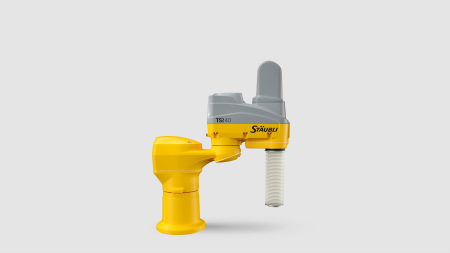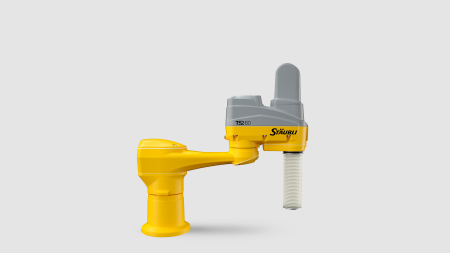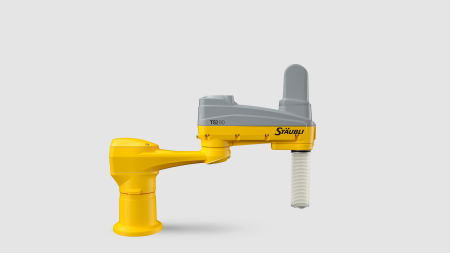- Europe
- Americas
- Asia and Middle East
- Africa and Oceania
SUCCESS STORY
Sensitive processes intelligently automated
Tire pressure sensors are now standard equipment in the automotive sector. An Austrian company has built a highly complex assembly line with an output of four million sensors per year for a Chinese manufacturer - an impressive project.
CUSTOMER BENEFITS
- competent support from Stäubli
- very compact design of the line
- high performance of the new TS2 SCARA series
- maximum process reliability despite high line complexity
TASK
Zero-fault assembly of tire pressure sensors
At six-second intervals, a highly automated line with three Stäubli robots assembles tire pressure sensors - four million units per year. The complex line convinces with impressive availability.
Today, every car tire has a sensor that measures the pressure in the tire and sends a signal to a receiver unit via radio. This has created a market worth millions for automotive suppliers with sensor know-how – and an interesting field of activity for automation technology specialists.
One of these is MMS Modular Molding Systems GmbH in Berndorf, Austria, which built a compact and fully automated assembly system for tire pressure sensors for the Chinese automotive supplier BH Sens.
In addition to the assembly of ten components into a complete sensor, BH Sens' requirements also included the integration of various test steps and very high availability of the fully automated system with short cycle times. Four million sensors per year is the target; a sensor is to be produced every six seconds. Flexibility is also required because three sensor variants with different plates have to be assembled.
SOLUTION
Precise handling with three SCARA robots
Assembly starts with a rotary indexing table, and the components are handled by three Stäubli robots. The first four-axis robot, a large TS2-80, removes the blank from a tray and places it in a workpiece carrier. The second SCARA robot, a TS2-60, picks up the battery from another tray and places it on the board. During this process, the four-axis robot of the new TS2 generation must not only work quickly, but also with the utmost precision, supported by a vision system.
The next step is three soldering stations on the rotary table, which connect the battery contacts to the circuit board. The assembly is now ready and is placed in the housing provided. Then the third Stäubli SCARA, a very compact TS2-40, takes over, guided by camera, the insertion of a plastic seal in the correct position.
Once the seal has been successfully fitted, the printed circuit board is placed on top, which is then positively connected to the housing by hot caulking. Finally, the housing cover is placed on the housing assembly and welded airtight by a laser.
After a large number of 100 percent QA tests such as voltage test, height check of the board, air tightness tests up to the "end-of-line" test, the mounting of the sensor on the valve and the automatic screwing of the assembly complete the entire process.
CUSTOMER USAGE
High performance of the new SCARA series
MMS chose Stäubli's brand-new TS2 series SCARAs because of their ideal interaction with the vision systems for part alignment, as well as their communication with the feeding systems.
The uniVAL plc interface of the Stäubli robots paid off when programming the system. It enables simple connection to the higher-level Siemens S7 controller. MMS meets the demand for flexibility by making it possible to change variants without having to modify the hardware.
Other important factors in the selection of robots from MMS's point of view were the extremely high availability, precision and dynamics of the robots. The assembly system runs around the clock with short cycle times. Because of the small components that are handled, long-term precision is an additional decision criterion. And MMS was also enthusiastic about the customer support provided by Stäubli in Austria and Bayreuth.
What does the customer say?
ABOUT MMS:
MMS is an automation company delivering “Turn-Key” Production machines for automotive- electrical-, medical and telecommunication industry. With in-house design and toolmaking capabilities MMS is the “One-Stop-Shop” for manufacturing and/or assembly of small metal and plastic parts. MMS has also developed their own micro injection molding modules for smallest hybrid components. The modular concept of the production systems offers highest flexibility for quick and traceable production.
-

TS2-40
Reach: 460 mm Maximum payload: 8,4 kg Repeatability: ± 0.01 mm Stroke: 200 mm (400 mm optional) -

TS2-60
Reach: 620 mm Maximum payload: 8,4 kg Repeatability: ± 0.01 mm Stroke: 200 mm (400 mm optional) -

TS2-80
Reach: 800 mm Maximum payload: 8,4 kg Repeatability: ± 0.015 mm Stroke: 200 mm (400 mm optional)
